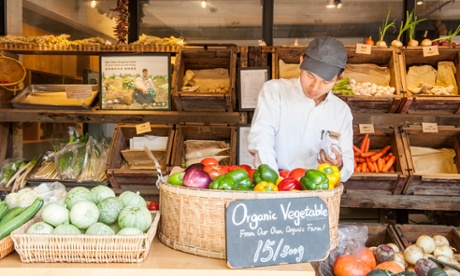
Rat meat masquerading as lamb, cabbage doused in formaldehyde, rice containing arsenic and rotten-meat burgers, all cooked in recycled oil collected from a sewer. This is not a menu from a dystopian nightmare, but a small sample of the food safety scandals that have besieged Chinese consumers in recent years.
No type of food has been spared and the scandals have led to enormous mistrust among consumers. “Food safety is definitely among the top concerns of Chinese people,” says Wang Jing, a food and agriculture campaigner with Greenpeace China. “It’s literally everywhere around people’s lives.”.
In a survey last year, 80% of respondents said they were upset about the food safety situation in China. The poll of 3,166 people across 20 cities was conducted in the aftermath of a food scandal involving out-of-date meat supplied to top fast-food outlets.
Concerns relate to all stages of food production, from processing back to the growing of vegetables and breeding of livestock. One of the most shocking and high profile cases was in 2008, when melamine-tainted milk powder led to the deaths of six infants and hundreds more being admitted to hospital. While standards have improved and efforts have been made to reassure the public, the mistrust of Chinese-produced milk powder remains, leading to high demand for imported milk products.
Added to these scandals is China’s alarmingly high level of pollution, a result of its rapid coal-driven economic growth. Thick swathes of grey smog regularly engulf many cities, while rivers and soil are poisoned by heavy metals from industry and mining. According to government figures, up to 40% of rivers and 20% of farmland is polluted.
Urbanisation has happened at a rate never seen before as people flock from the countryside to China’s burgeoning cities. These new city dwellers increasingly find themselves disconnected from the source of their food, and with so many scandals it is often difficult for them to ensure their food is safe.
Emily Xu, a young mother who runs a children’s reading and writing studio in Shanghai, says food safety is a big concern for her and many of her friends, particularly since their children were born. “The more you learn about [food safety scandals] the more upset you will be. Sometimes you just feel helpless because you can’t change the air or you can’t change the soil, you can’t change the way farmers do the farming. And it seems the government can’t do anything to help. More and more, I have friends who choose to emigrate.”
Many urban residents seek out alternative food sources. Organic food and imported products have risen in popularity and are considered a safer option than the traditional “wet” markets where fresh vegetables, meat and fish are sold. In cities such as Beijing and Shanghai, the number of specialist and boutique food shops selling organic food is growing, especially among the Chinese middle class and expatriate community who have disposable income and are willing to pay a premium for good-quality, safe food.
One such outlet is Green and Safe, a Taiwanese-owned shop in Shanghai’s up-market former French Concession area. Much of the fresh produce comes from the company’s own farm a few hours from Shanghai. The store also sells imported organic goods, meat and fish, bread from its own bakery and has a restaurant and cafe.
Mrs Li is a regular customer and is carefully picking through the baskets of vegetables, looking for the best ones to make food for her son. “The vegetables here are in decent shape,” she says approvingly. They cost considerably more than those sold at the local markets, but Mrs Li said she is prepared to pay extra. “I know that this market has their own farm and the water they use is much cleaner than others’.”
Many city residents are buying directly from farmers they trust who grow vegetables without pesticides. Community-supported farms have become increasingly popular, says Wang, along with farmers’ markets. A small group of consumers has also begun to grow food themselves, sometimes renting land on the outskirts of the cities.
However, all of these options are relatively expensive and not open to most average-income families. Those who can’t afford the premium price of organic or imported food “basically have not much choice”, says Wang. She believes access to safe food should not be dependent on income. “Everyone has the right to safe food, it’s a joint responsibility of companies, the government and consumers ourselves to make this happen by altering chemical-intensive agriculture to a more ecological and sustainable way of growing food.”
The food hub is funded by the Irish Food Board. All content is editorially independent except for pieces labelled “brought to you by”. Find out more here.
Join the community of sustainability professionals and experts. Become a GSB member to get more stories like this direct to your inbox

